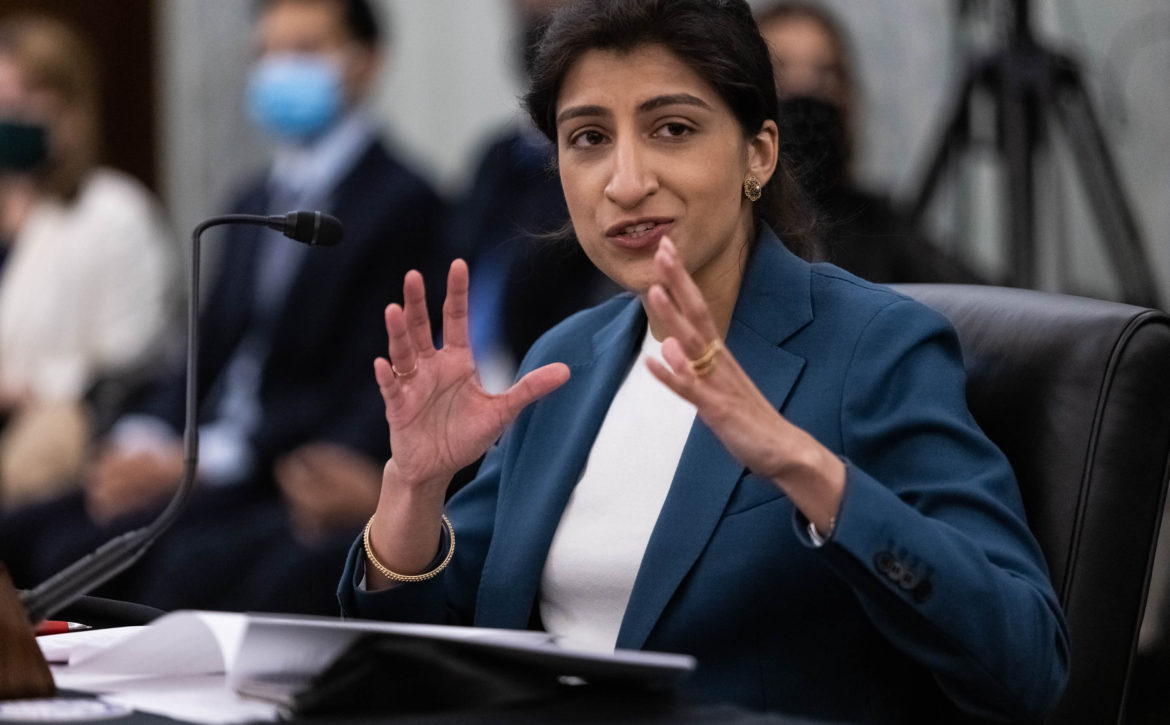
Who’s Afraid of Lina Khan? (All the Right People.)
Judging by the reaction of the tech industry and the conservative press, Lina Khan, the chair of the Federal Trade Commission, may be the most feared figure in Joe Biden’s administration. This week, Facebook demanded that Khan, a 32-year-old Columbia Law School professor who in recent years became a leading intellectual in antitrust law, recuse herself from an antitrust suit involving the company, claiming that she was biased against it. That followed a similar demand last month from Amazon, which argued in a 25-page petition that it believed Khan’s FTC “would not be a neutral and impartial evaluator of the evidence developed in any antitrust investigation against Amazon or in deciding whether to bring enforcement actions against the company.” In the last 10 days, The Wall Street Journal has published at least three opinion pieces critical of Khan, accusing her of a “power grab” and of helping the tech giants she claims to critique. “Imagining the FTC as Icarus flying without the constraints of history, economics or law is a fun thought experiment, but we’ve been here before,” wrote Joshua D. Wright, a former FTC commissioner who is now executive director of the Global Antitrust Institute at George Mason University’s Scalia Law School. Wright argued that Republicans critical of big tech had been “played.” In his view, Khan’s ascension was “ominous,” as she “wasted no time making confetti of the guardrails at the FTC.”Khan has the right enemies, and the accumulating critiques of her (barely begun) tenure are a sign that she may genuinely have the authority, instincts, and acumen to meaningfully rein in the power of companies like Facebook and Amazon. Earlier in her career, Khan wrote a paper on Amazon’s monopoly status that became a sensation in the world of antitrust scholarship. “The current framework in antitrust … is unequipped to capture the architecture of market power in the modern economy,” wrote Khan in The Yale Law Review. She called for more action on predatory pricing and a skeptical approach to vertical integration that allowed platform companies like Amazon to become “the titan of twenty-first-century commerce.” She was celebrated—The New York Times said she “reframed decades of monopoly law”—and occasionally derided, with her writings glibly dismissed by Republican Senator Orrin Hatch as “hipster antitrust.” More thoughtful observers consider Khan an important figure in the New Brandeis movement of antitrust scholars, who believe, as she wrote, that “antimonopoly is a key tool and philosophical underpinning for structuring society on a democratic foundation.” Now tech monopolies fear she may finally be in a position to put her academic ideas into action. We would be fortunate if she did.But fear of Khan may extend to the agency she now leads. The FTC’s own lawyers, including some who didn’t vote for Donald Trump, are reportedly leery of Khan, with greater than normal turnover as career staffers flee to the clutches of big law or big tech. Amazon and Facebook are among the tech giants hiring antitrust lawyers who might normally be on the other side of the legal bench from them. Ironically—or perhaps representing a textbook example of regulatory capture—the expected increase in FTC activity has led tech companies to recruit those same lawyers who might otherwise be charged with investigating their business practices.The lawyers leaving the FTC, National Journal reported, “have different views compared with Khan’s ideas of what constitutes antitrust behavior and how to bring cases.” As Politico noted after Khan’s confirmation, the FTC has been blasted by progressives for not enforcing existing antitrust laws and for failing to use its potentially broad authorities to promote fair competition. The Obama-era FTC was widely seen as friendly to industry, and advocates hope that Khan’s appointment represents a deliberate departure from an earlier, more passive agency that, for example, closed an antitrust probe into Google in 2013. As Edward Ongweso Jr. wrote in Motherboard, Khan’s job will be easier if she has the support of Congress, but existing FTC authorities—like Section 5 of the FTC Act, which allows the agency to set antitrust policy regarding unfair competition—could allow the agency to press forward without new laws or congressional political backing. It may have to: The Biden administration is, in the revolving door tradition, well stocked with former senior figures at major tech companies. Khan’s appointment in March was heralded by leftists and liberals, while 21 Senate Republicans, animated by their own desire to tamp down the censorious power of big tech, voted for her confirmation. Republican Missouri Senator Josh Hawley praised her for striking fear into Silicon Valley boardrooms. Progressive reformers and antitrust thinkers like Zephyr Teachout consider her an esteemed colleague.Yet despite the excitement Khan galvanizes among supporters, the Biden administration’s plan for tackling monopolies and promoting competition still has a major hole: There is no chair of the Department of Justice’s antitrust division, and some observers are baffled that one hasn’t been nominated yet, even if it may lead to a contentious confirmation fight. And it’s not just antitrust; civil rights and immigration and other important DOJ positions remain unfilled. “Nearly six months into President Biden’s tenure, his Department of Justice is understaffed and unprepared to tackle the pressing issues facing the administration,” wrote The American Prospect this week.As Alexander Sammon recently noted, also in the Prospect, Biden’s recent executive order outlining a multi-agency effort to deal with monopoly, corporate consolidation, and economic competition is potentially compromised from the start without someone heading the DOJ’s antitrust division. A behind-the-scenes battle between various poles of the Democratic Party—candidates range from a Facebook-suing plaintiff’s attorney to one of Facebook’s former lawyers—has seemingly been quashed “by simply not appointing anyone to the position.”Biden’s recent order seemed to confirm many of Khan’s ideas about the need to promote competition and to dig into the business practices and platform structures that have allowed companies like Amazon and Facebook to dominate their respective industries. Biden’s executive order is part of an “important cross-government effort to re-center antimonopoly policy as a key tool for promoting a fair and thriving economy,” wrote Khan on Twitter. She added: “This is an all-hands-on-deck moment to address unchecked market concentration and promote fair competition.”The problem of monopoly and market concentration extends far beyond the tech industry to nearly all aspects of the American economy. The work ahead for Khan and her political allies is tremendous; the headwinds, especially in the form of industry pushback and attempts to discredit her, are already formidable. Without the kind of all-of-government effort Khan seeks, we may find her agency jousting trillion-dollar companies that, even if they are broken up, may very well reform and reconsolidate in the way that, say, AT&T did (or Microsoft, a $2 trillion company that doesn’t always figure in current antitrust discussions).Still, Khan likely represents the best opportunity the government has had in a while to carve out a new policy toward corporate monopoly. She hasn’t had much of a chance to do anything yet, but the lines drawn by her critics and supporters alike are all too clear. The tech giants and their supporters fear Lina Khan. They should.
Read More


